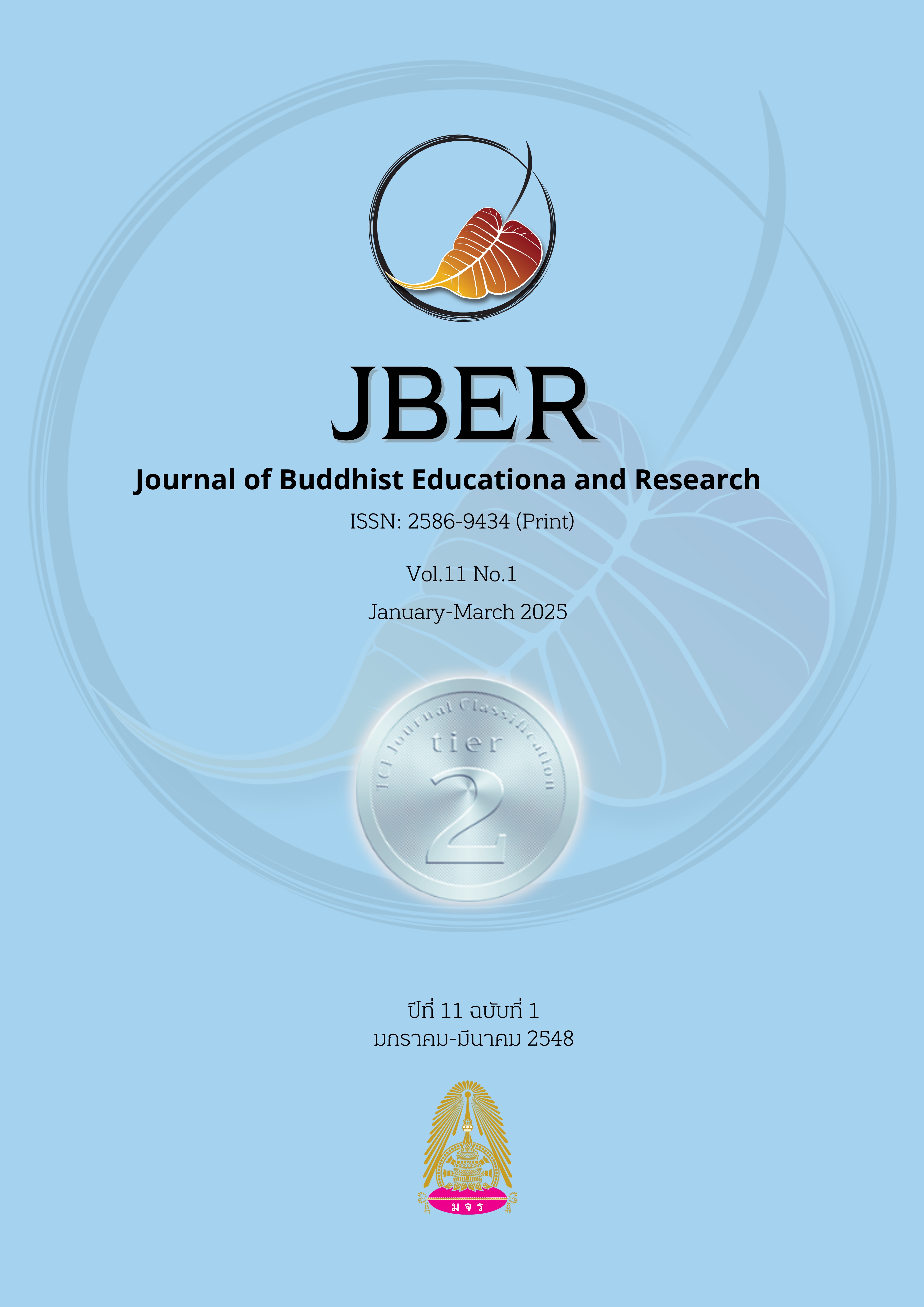The Effects of Problem-Based Learning (PBL) with Games on Learning Achievement and Problem-Solving Skills on the Heterogeneous Mixture Separation in Science for Primary 6 Students
Keywords:
problem-based learning, games, learning achievement, problem-solving skillsAbstract
The objectives of this research were to: 1) compare pretest and posttest scores of students on the heterogeneous mixture separation; 2) compare pretest and posttest scores of students of problem-solving skills; and 3) explore the students’ satisfaction towards problem-based learning with games. The target group comprised 13 primary 6 students from Bantungpanan School for the academic year 2024, selected through cluster sampling. The research instruments included 1) learning game, 2) lesson plans problem-based learning with games, 3) a learn achievement test, 4) a problem-solving skills test, and 5) a form used to measure satisfaction on science by using problem-based learning with games. Data were analyzed using mean, standard deviation, and dependent samples t-test. The research results showed that 1) The students’ posttest scores of learning achievement by using problem-based learning with games were higher than pretest scores, with statistical significance at the 0.05 level, 2) The students’ posttest scores of problem-solving skills by using problem-based learning with games of students were higher than their pretest scores, with statistical significance at the 0.05 level, and 3) The students’ satisfaction towards problem-based learning with games overall was the highest (x̅ = 4.79, S.D. = 0.10).
References
กานดา ยนตรการกำจร และ อรนุช ลิมตศิริ. (2566). การเปรียบเทียบผลสัมฤทธิ์ทางการเรียนวิชาสังคมศึกษา เรื่องทวีปเชีย ที่สอนด้วยการใช้ปัญหาเป็นฐานกับการสอนแบบบปกติ ของนักเรียนชั้นมัธยมศึกษาปีที่ 1 โรงเรียนธรรมศาสตร์คลองหลวงวิทยาคม. วารสารวิชาการ มจร บุรีรัมย์, 8 (1), 204-215.
ฌัชวิทย์ อินทราราม และ มานิตย์ อาษานอก. (2567). การพัฒนาบทเรียนบนเว็บตามหลักการเรียนรู้ปัญหาเป็นฐาน ที่ส่งเสริมทักษะการแก่ปัญหาในรายวิชาวิทยาการคำนวณและการออกแบบเทคโนโลยี สำหรับนักเรียนระดับชั้นประกมศึกษาปีที่ 6. วารสาร เทคโนโลยีและสื่อสารการศึกษาคณ:ศึกษาศาสตร์ มหาวิทยาลัยมหาสารคาม, 7 (21), 143-152.
ณัฏฐา ผิวมา. (2566). ผลการจัดการเรียนรู้แบบผสมผสาน (Blended Learning) โดยใช้เกมเป็นฐานที่มีต่อผลสัมฤทธิ์ทางการเรียน เรื่องคำศัพท์ ไวยากรณ์ สำนวนเพื่อการนำเสนอเป็นภาษาอังกฤษอย่างเป็นทางการ รายวิชาภาษาอังกฤษเพื่อการนำเสนอของนักศึกษา สาขาวิชาวิทยาการคอมพิวเตอร์ มหาวิทยาลัยสวนดุสิต. วารสารวิชาการเทคโนโลยีการจัดการ, 4 (2), 84-96.
ตุลา ประทับ และ สุดคนึง นฤพนธ์จิรกุล. (2565). การพัฒนาทักษะการแก้ปัญหาทางคณิตศาสตร์โดยใช้กิจกรรม Model Eliciting Activities ร่วมกับเกมกระดานสำหรับนักเรียนชั้นมัธยมศึกษาปีที่ 3. วารสาร มจร อุบลปริทรรศน์, 8 (2), 867-879.
ธันยพร ศรีวิชัย. (2560). การจัดการเรียนรู้โดยใช้ปัญหาเป็นฐานเพื่อพัฒนาผลสัมฤทธิ์ทางการเรียนและความสามารถในการให้เหตุผลทางวิทยาศาสตร์ รายวิชาเคมีพื้นฐาน เรื่องปฏิกิริยาเคมี สำหรับนักเรียนชั้นมัธยมศึกษาปีที่ 4. วิทยานิพนธ์ครุศาสตรมหาบัณฑิต, มหาวิทยาลัยรังสิต.
นัยสิทธิ์ นันขันตีและยาใจ พงษ์บริบูรณ์. (2564). การพัฒนาทักษะการแก้ปัญหาทาทางคณิตศาสตร์และผลสัมฤทธิ์ทางการเรียน เรื่องการประยุกต์อัตราส่วนและร้อยละ ด้วยการจัดการเรียนรู้ใช้ปัญหาเป็นฐานและกระบวนการแก้ปัญหาของโพลยา ของนักเรียนชั้นมัธยมศึกษาปีที่ 2. วารสาร มจร อุบลปริทรรศน์, 6 (3), 123-135.
บุญชม ศรีสะอาด. (2560). การวิจัยเบื้องต้น (พิมพ์ครั้งที่ 10). กรุงเทพฯ: สุวีริยาสาส์น.
บุญญารินทร์ อ่อนนุ่ม (2560). การเสริมสร้างความสามารถในการแก้ปัญหา โดยการจัดการเรียนรู้แบบใช้ปัญหาเป็นฐานร่วมกับเทคนิคเกมิฟิเคชัน สำหรับนักเรียนห้องเรียนพิเศษวิทยาศาสตร์ ชั้นมัธยมศึกษาปีที่ 4 โรงเรียนผดุงนารี. วิทยานิพนธ์ครุศาสตรมหาบัณฑิต, มหาวิทยาลัยรายภัฏมหาสารคาม.
ปาฏิหารย์ นักฆ้อง, ชมนาด เชื้อสุวรรณทวี, และรุ่งทิวา แย้มรุ่ง. (2567). การจัดการเรียนรู้โดยใช้ปัญหาเป็นฐานร่วมกับเทคนิคการแข่งขันระหว่างกลุ่มด้วยเกมที่มีผลต่อความสามารถในการแก้ปัญหาทางคณิตศาสตร์ของนักเรียนชั้นมัธยมศึกษาปีที่ 5. วารสารมหาจุฬานาครทรรศน์, 11 (8), 176-183.
พงษ์ดนัย ผดุงโชค และนิลรัตน์ โคตะ. (2567). การพัฒนาผลสัมฤทธิ์ทางการเรียนและสมรรถนะการอธิบายปรากฏการเชิงวิทยาศาสตร์ หน่วยการเรียนรู้ ระบบร่างกาย โดยการจัดการเรียนรู้แบบสืบเสาะร่วมกับเกม สำหรับนักเรียนชั้นมัธยมศึกษาปีที่ 2. วารสารมหาวิทยาลัยราชภัฏมหาสารคาม, 18 (2), 115-124.
วุฒิภัทร วงศ์ประโคน และ พงศ์ธนัช แซ่จู. (2564). การพัฒนาบทเรียนมัลติมิเดียโดยใช้รูปแบบการจัดการเรียนรู้ปัญหาเป็นฐาน (PBL)เพื่อส่งเสริมทักษะการแก้ปัญหาในการเขียนโปรแกรมภาษาชีสำหรับนักเรียนชั้นมัธยมศึกษาปีที่ 4. Journal of Modern Learning Development, 6 (6), 89-103.
Barbosa, J. (2004). Perception of multidimensional stimuli: A differential sensitivity account of cognitive processing and development. Journal Of Experimental Child Psychology, 54, 213-249.
Cindy E. Hmelo-Silver. (2004). Problem-based learning: What and how do students learn?. Educational Psychology Review, 16(3), 235-266.
Nurdeli Lasniroha Sagala. (2017). “The Influence of Problem Based Learning Model on Scientific Process Skill and Problem Solving Ability of Student.” IOSR Journal of Research & Method in Education (IOSR-JRME), 7(4), 01-09.
Rubin, k. &Maion, T. (2000). Play reference and its relationship to egocentrism popularity longitudinal study. Dissertation Abstracts International, 60(11), 171-179.
Tarhan, L, and Acar-Sesen, B. (2013). Problem based learning in acids and bases: Learning achievements and students' beliefs. Journal of Baltic Science Education, 12(5), 565 - 578.
Downloads
Published
How to Cite
Issue
Section
License
Copyright (c) 2025 Journal of Buddhist Education and Research (JBER)

This work is licensed under a Creative Commons Attribution-NonCommercial-NoDerivatives 4.0 International License.





